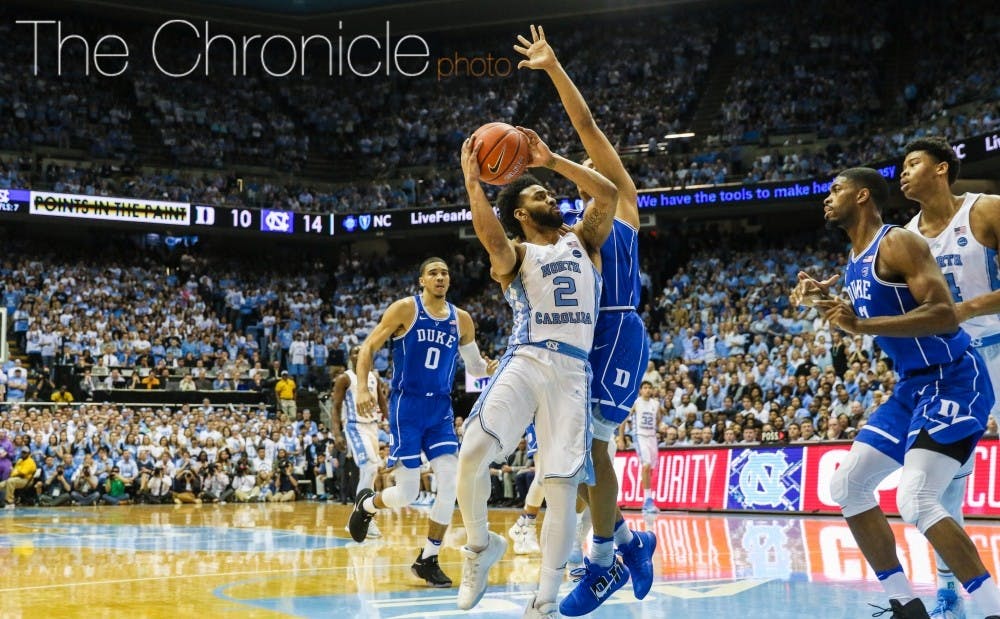Each day leading up to the first round of the NCAA tournament, The Chronicle will preview one of the four regions in the bracket, touching on the true contenders in the region and potential bracket-busting Cinderellas. Yesterday, we broke down the East and today we will analyze the South region—the Midwest and West quarters will be on their way before the Round of 64 games get underway Thursday afternoon.
The No. 1 seed: North Carolina Tar Heels
After making it all the way to the national title game last season, North Carolina lost Marcus Paige and Brice Johnson but remained the most dominant team in the nation's deepest conference. The Tar Heels have the fifth-best scoring offense of any tournament team—they average 84.9 points per game led by ACC Player of the Year Justin Jackson. Joel Berry II is a dynamic point guard who shoots 41.5 percent from long distance but also averages almost four assists a game to set the tone for the Tar Heel attack.
North Carolina had an undefeated season in Chapel Hill, with all seven of its defeats coming either on the road or at a neutral site—including a pair of losses to Duke. Although the Tar Heels outscored ACC opponents by more than nine points per game, they beat just one tournament team, Wake Forest, in a true road game.
That being said, North Carolina has the size to dominate its opponents with the 6-foot-8 Jackson playing the three alongside the Tar Heels' big man trio of seniors Kennedy Meeks and Isaiah Hicks alongside freshman Tony Bradley. The threesome make North Carolina the nation's best rebounding team and will present nearly any team the Tar Heels face with significant matchup problems.
The other contenders: Kentucky, UCLA just part of the tournament's toughest region
It is hard to argue that the South will not be the most challenging region of the four in this year's bracket. Featuring North Carolina, the Wildcats and Bruins, the road to Memphis also includes an underseeded No. 10 Wichita State team that may face Kentucky in the second round yet again. When the Shockers were a No. 1 seed just three years ago, they drew the Wildcats as the eighth-seeded team in their region and Kentucky ultimately sent Wichita State home early—just extra fuel for the Shockers with the roles reversed this time around.
Kentucky already knocked off the Tar Heels in mid-December with a 103-100 shootout win in Las Vegas, and North Carolina probably still has nightmares of Malik Monk—the stud Wildcat freshman put up a whopping 47 points on 18-of-28 shooting that day and has the potential to single-handedly carry his team to the Final Four. UCLA is yet another offensive juggernaut with plenty of its own starpower as freshmen Lonzo Ball and T.J. Leaf lead the Bruins along with senior Bryce Alford, son of head coach Steve Alford. And do not forget about Butler—the Bulldogs were upset in the Big East tournament quarterfinals, but knocked off Villanova twice during the regular season and always seem to find the magic in March to make a run.
The potential Cinderella: Wake Forest
With a First Four game Tuesday night, there is a possibility that the Demon Deacons do not even get the opportunity to face No. 6 seed Cincinnati Thursday, but the Wake Forest offense could set up an intriguing battle against the Bearcats' fifth-ranked scoring defense in the first round. The Demon Deacons feature a fringe lottery pick and the ACC's Most Improved Player in sophomore John Collins, a 6-foot-10 big man who nearly averaged a double-double this season at 18.9 points and 9.8 rebounds per game.
Wake Forest averages almost 83 points a night and ranks eighth in Ken Pomeroy's adjusted offense metric, just ahead of No. 1 seeds Kansas and Gonzaga. Although head coach Danny Manning's team really struggles to defend, the Demon Deacons rode their offense to victories against Louisville and Virginia Tech in the last week of the regular season despite beating just one tournament team the rest of the season. If Wake Forest can win two games, it would likely battle UCLA in what could be a shootout. And any further chaos could give the Demon Deacons a chance to be this year's bracket-buster with a pair of national title contenders in the bottom half of the South region.
The regional narrative: Perennial powers
Between the top three seeds in this region, there are 24 national titles, and all the region's teams have combined for 27—the next closest region is the East with 11. North Carolina, Kentucky and the Bruins all have the elite talent to emerge as the region's winner with both experience and youth spread throughout all three rosters.
But even the South region's non-blue bloods have been steady forces in the past few seasons—Butler has made the NCAA tournament in nine out of the last 11 years, Cincinnati has earned a bid each of the last seven seasons, Dayton made a surprise run to the Elite Eight in 2014 and Wichita State advanced to the Final Four just four seasons ago.
Even with the Tar Heels as the favorite, the South region will likely be anything but straightforward, as there are plenty of teams with tournament experience that will have no fear in challenging North Carolina for a trip to Glendale, Ariz., in early April.
Get The Chronicle straight to your inbox
Signup for our weekly newsletter. Cancel at any time.
Twitter: @mpgladstone13
A junior from just outside Philadelphia, Mitchell is probably reminding you how the Eagles won the Super Bowl this year and that the Phillies are definitely on the rebound. Outside of The Chronicle, he majors in Economics, minors in Statistics and is working toward the PJMS certificate, in addition to playing trombone in the Duke University Marching Band. And if you're getting him a sandwich with beef and cheese outside the state of Pennsylvania, you best not call it a "Philly cheesesteak."

